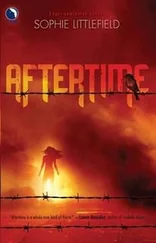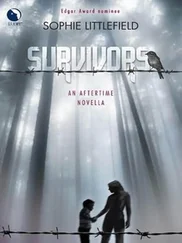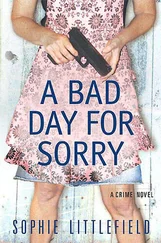But before he could aim, the thing lurched sideways, taking a shot in the upper chest. Not a fatal injury, but enough to slow it down. Smoke looked for the shooter and saw three of the others, no-four, all armed, one man with only a blade-coming tentatively closer.
Smoke shot the last two uninjured Beaters in quick succession, and they collapsed on top of the poor dead woman. One of the Edenites, a short wiry woman, ran to the Beater that was crawling along the blood-slicked floor, jammed the muzzle of a gun against its forehead and fired, getting splattered with gore.
Smoke approached her, wary that she might fire again. “Hey,” he said gently, putting a hand on her shoulder. “Don’t get so close if you don’t have to. That’s taking a hell of a chance.”
The woman looked at him, wild-eyed, her mouth trembling. “It’s just I never shot a gun before,” she said. “I wanted to make sure I didn’t miss.”
Damn. The last thing they needed was weapons in the hands of people who had no idea how to use them. “Whose gun is that?”
“It’s some…somebody dropped it. Over there.”
“You did good,” Smoke said, taking it carefully from her hand, pushing the barrel down. “You didn’t miss, not one bit.”
“What do we do now?” One of the slacker guys, the ones who had been skateboarding along the edge of the crowd, was tugging on Smoke’s sleeve like he was five years old. Smoke didn’t bother asking him if he was armed. “There’s more of them down there, did you see? Did you? Oh, Jesus, what’re we going to do?”
“I saw. Look, maybe you can help out here, okay?” Smoke pointed to the entrance lobby, where several people had been knocked down in the panic to reach the doors. One woman had a gash on her forehead and was leaning against the locked door, crying. “How about you see what they need, okay?”
The boy turned dubiously toward the fallen. “Yeah, I want to help and all but-”
“Then do it.” Smoke had run out of patience. He scanned the mall in both directions, saw a couple of the Easterners conferring at the junction with the other wing, past half a dozen storefronts. They, at least, were armed. And there. There was Dor, working at the heavy door. Someone had hacked away at the hinge and the thick metal had split, exposing wires from the security system and the mechanical closing mechanism.
Next to him was Sammi, holding something, a narrow tool of some sort. Her face was pale but as her father worked she remained steady, handing him what he needed from a small leather bag. Smoke recognized that bag-back when he’d been second-in-command in the Box, he remembered Dor carrying his tools with him on his belt. Back then they’d been useful for repairing sections of the chain-link fence that surrounded the Box-or for opening the occasional bottle of beer after a good raid.
How many mornings had the two men trained together? How many overcast days and chilly dawns had they raided together, watching each other’s backs at each unfamiliar house, each closed door? They’d been as close as two men so stubborn could be Aftertime, sharing confidences and, eventually, trust as the weeks turned into months and they soldiered on together.
And all that time, Smoke thought Dor didn’t like Cass. She’d told him so herself, described the way he avoided her, never looked her in the eye, found an excuse to leave whenever she arrived at the fire or one of the food-merchant stalls where he’d been passing the time.
But Smoke had never bothered to wonder why Dor avoided her so studiously. If he had, if he’d paid even a little more attention, it would have been so clear. Dor had loved her. Even then. And though he’d respected Smoke’s claim enough never to allow himself to be tempted, once Smoke left, all bets were off. No: after Smoke had nearly gotten himself killed, after he’d chosen a battle he could not win over a future with Cass. It was what she had been trying to tell him, that last day, when he left without saying goodbye because saying goodbye would have hurt too much, would have stolen his focus-he had chosen.
And she’d come for him anyway, saved him anyway. But what was left, after that battle, was a broken man, an un-whole man-and who could blame Cass and his old friend for letting down their guard, for giving up resisting, for seeking a little comfort?
He could. He could blame them, or at least Dor, and if it was wrong he didn’t care, and if it was pointless he didn’t care. He looked on his old friend and felt the burn of betrayal and the stirrings of hatred, and he knew he had to master these emotions or they would all certainly die. Dor, with his dexterity and determination and focus, was their best and possibly only hope for finding a way back out. Smoke would have to fight the Beaters without him. He turned away, forcing the bile of his hatred down, down and thinking only of the challenge of the next moments.
He had learned the Easterners’ names during the past few days of eavesdropping on their conversations. Mayhew-now dead. Davis was with the group that had pressed to the front-and Smoke saw him now, crouched next to Mayhew’s body, rifling through his blood-soaked shirt. What was he looking for, his weapon? Blade? But all the Easterners were well armed-in fact, he’d admired Nadir’s ebony-handled tactical knife.
The other two were working at the entrance-Nadir, the most outgoing of the four, the one who chatted with the older folks and made wisecracks with the kids, and the Mack-truck-built Bart. They were kicking at the emergency exit door a few yards from Dor, grim-faced and silent, Bart putting his shoulder into it and making the frame shiver with each assault. It was possible that he’d dent the thing, but nearly inconceivable that he’d break through. And definitely not in time. The mall architects and then its dwellers had made sure of that, locking everyone in with great care.
The issue came up every time someone wandered out of the Box, drunk or bored or simply looking for a little solitude, and managed to get themselves killed instead. Then there would be calls for securing the exits, for preventing people from leaving. These demands had been put down firmly by Dor: personal liberties were not taken for granted in the Box. But here-in this temple of suburban consumerism, it was not hard to imagine a different outcome.
Smoke made his choice. He didn’t know any of the group, other than Dor, well enough to be certain who would be best in a fight, but the Easterners were disciplined, at least, and armed. “Nadir. Bart. Come on, we need to deal with these fuckers.”
The men joined him, the crowd closing in around the doors behind them, and considered the shambling crowd of newly turned, still at the far end of the mall. They moved slowly at this phase of the disease, their languorous quality one of the things that made the early stages deceptively appealing, the thing that caused people to call it “the beautiful death,” like tuberculosis a hundred years earlier.
They stopped using that term when the suffering advanced to the cannibalistic stages of the disease.
“They’re all infected, aren’t they?” Bart said, and Smoke saw that he was afraid. Which shouldn’t have been a surprise-who wouldn’t be terrified?-but the Easterners had accumulated, in very short order, a mystique around themselves, one that all the Edenites had bought into. It was so easy to grasp onto anything when you had nothing. Smoke should have known- would have known, if he had been paying attention-that they’d given away their allegiance too fast, that they’d bought into the flimsy illusion the strangers held up, giving too little thought to the dark side they were hiding.
Because every man had a dark side. Smoke knew this more than anyone, didn’t he?
Читать дальше
Конец ознакомительного отрывка
Купить книгу












